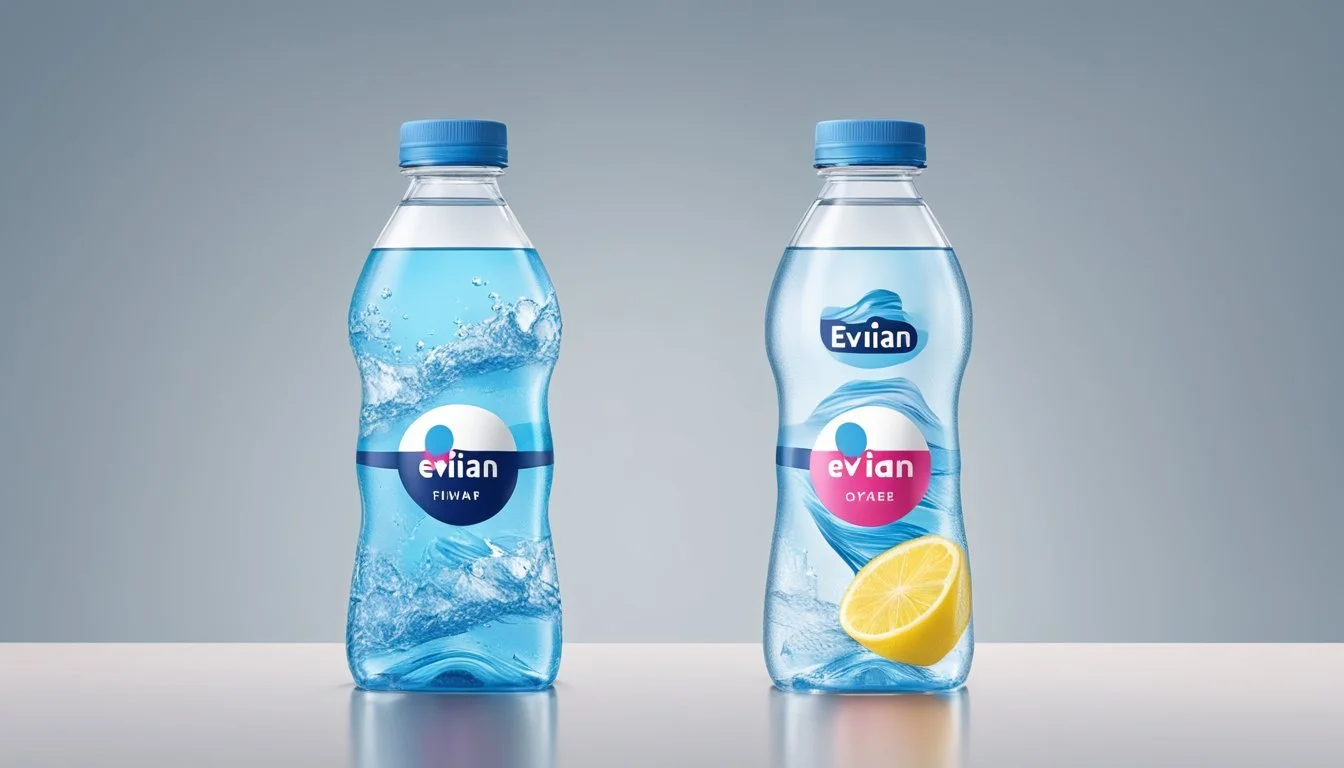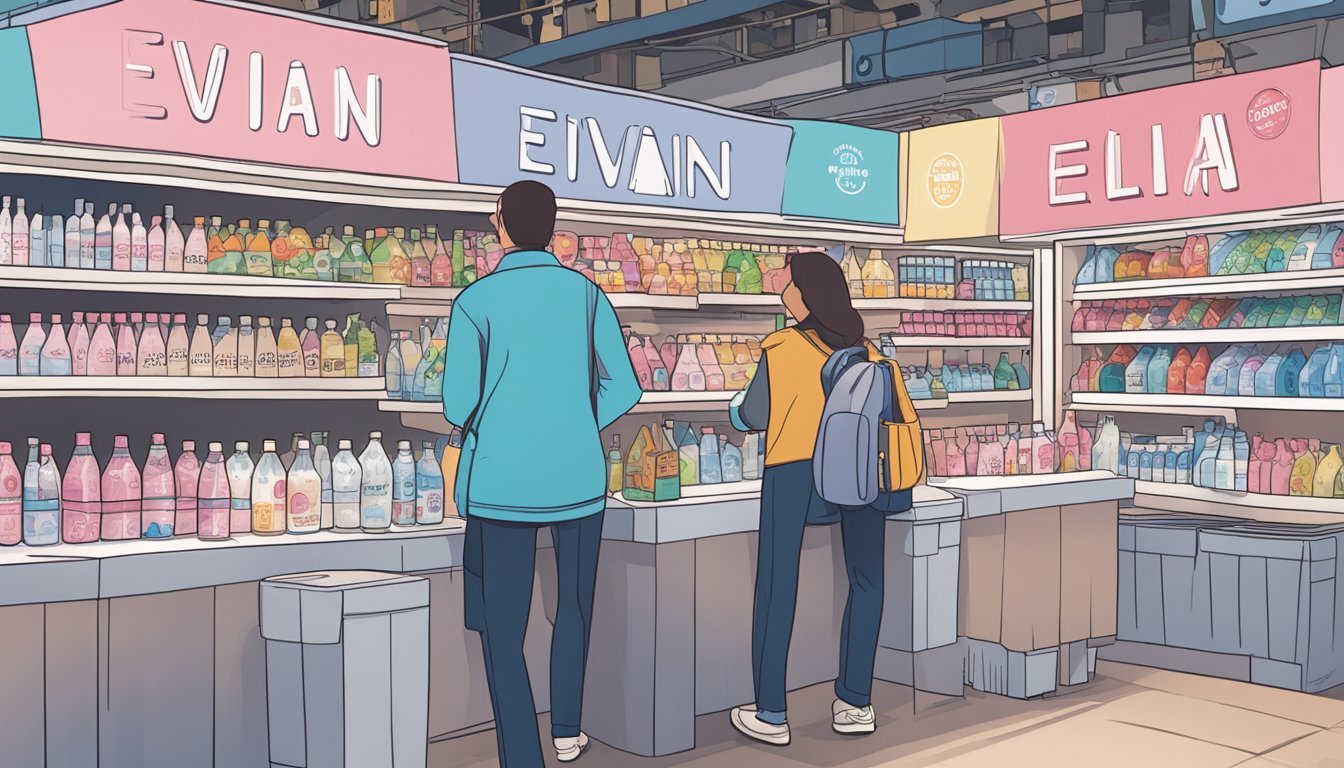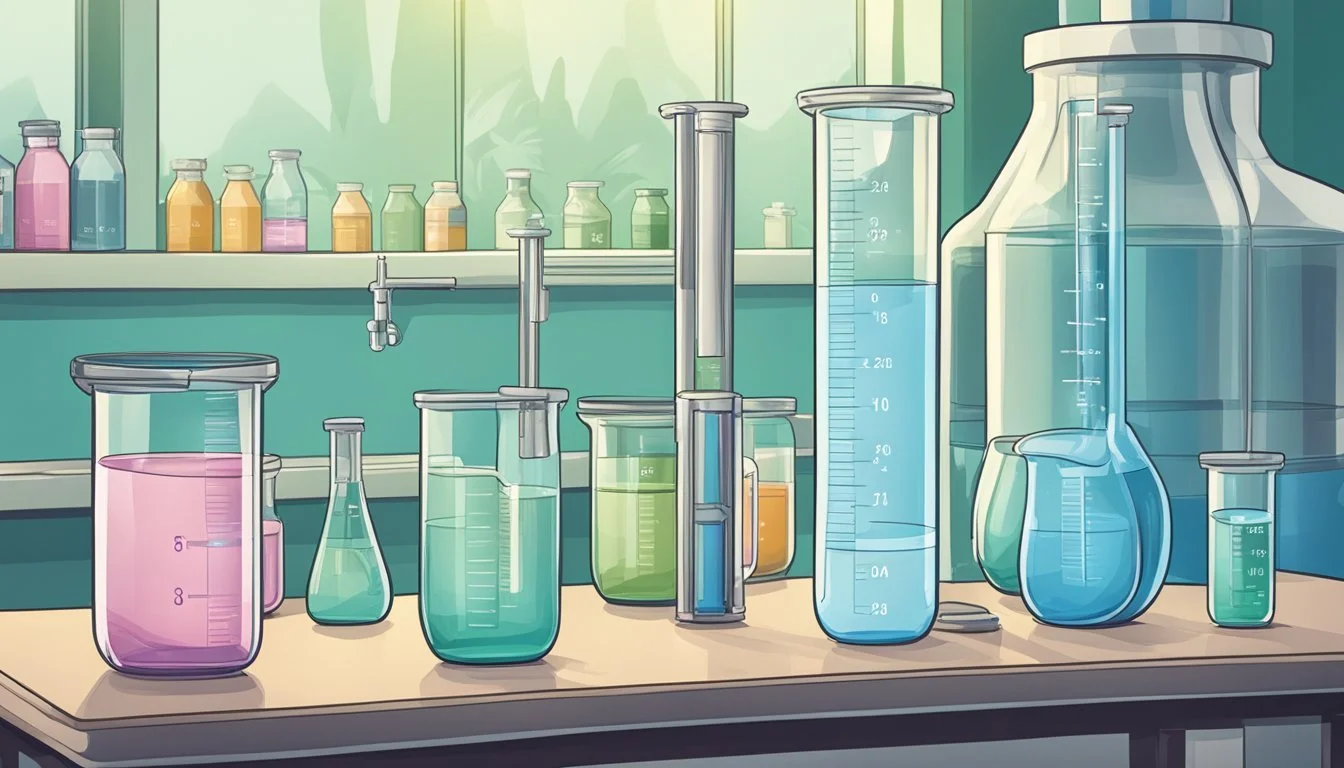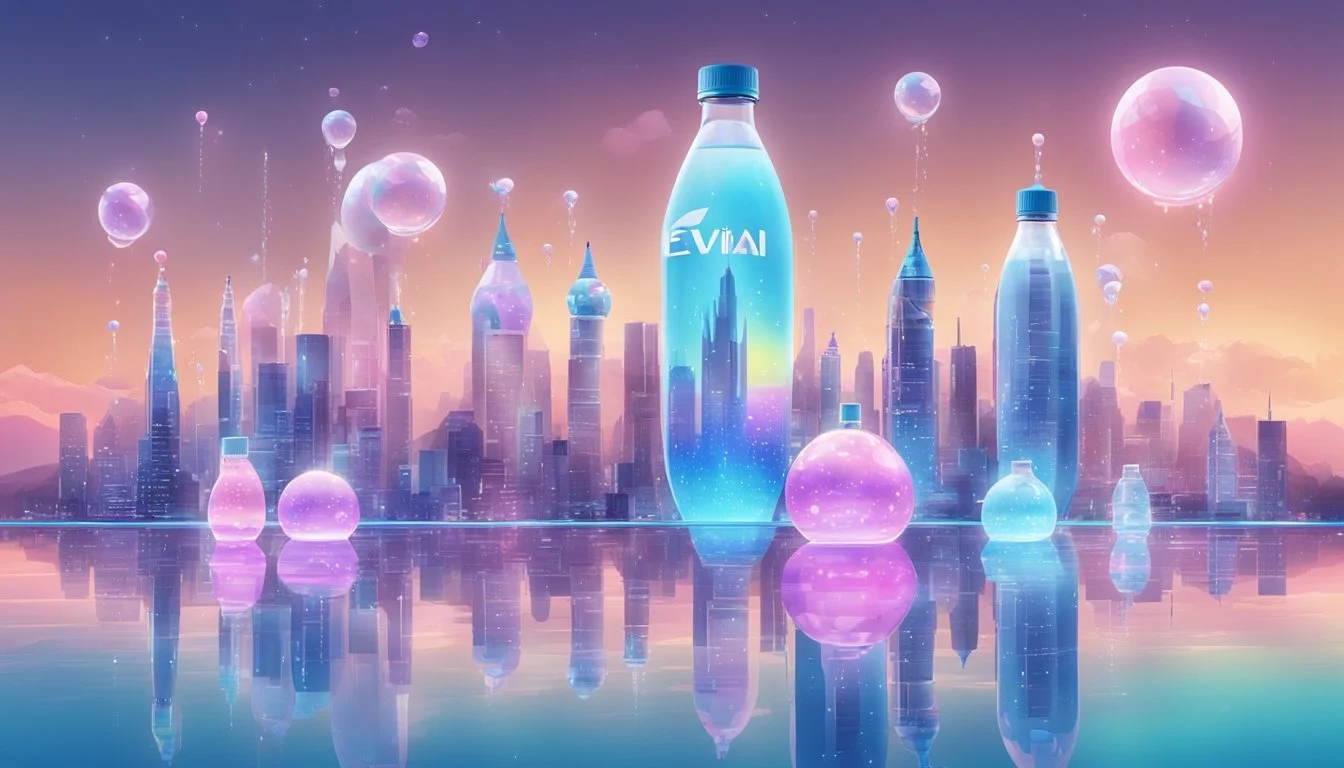Evian vs. Weird Water
Which Bottled Water is Better? Comprehensive Comparison
When it comes to bottled water, consumers often find themselves navigating a sea of options, each promising something different. Evian, a premium brand known for its natural spring source, has long been a staple for those seeking high-quality hydration. Meanwhile, Weird Water, an up-and-coming brand, markets itself with unique mineral content and an eco-friendly approach.
For those wondering which bottled water reigns supreme, the answer boils down to a mix of taste preference and desired mineral benefits. Evian's high calcium and magnesium content make it a favorite for those who prioritize these minerals, while Weird Water attracts attention with its distinctive flavor profile and sustainable practices.
In the world of bottled waters, choosing between Evian and Weird Water ultimately depends on personal preference. Both offer unique attributes catering to different needs, whether it's Evian's classic purity or Weird Water's innovative appeal. This blog post explores these characteristics to help you make the best choice for your next sip.
Overview of Bottled Water
Bottled water has grown from a niche product to a multi-billion dollar market. This section addresses how the industry has evolved, the types of bottled water available, and their distinct features.
The Evolution of Bottled Water
The bottled water industry has a long history that dates back to the 18th century. Initially marketed for its perceived health benefits, early bottled water was often sourced from natural springs.
In the 1970s, the bottled water market began to expand rapidly. Improved bottling technology and rising health consciousness among consumers played pivotal roles. Brands like Evian and Perrier capitalized on these trends by offering mineral-rich and sparkling options.
Today’s market is diverse, encompassing both high-end brands and everyday options. It also faces scrutiny regarding environmental impact, particularly the sustainability of plastic bottles. Efforts to reduce this impact include using recycled materials and promoting better recycling practices.
Different Types of Bottled Water
Various types of bottled water cater to different consumer needs and preferences. Mineral water contains naturally occurring minerals and is often marketed for its health benefits. Brands like Evian are notable for their mineral content, sourced directly from natural springs.
Spring water is collected from underground sources where water rises naturally to the surface. It retains the taste characteristics of its source, attracting those who prefer water in its natural state.
Artesian water comes from a well tapping a confined aquifer. This water is naturally filtered and protected from contamination, making it a premium choice.
Purified water undergoes processes like distillation or reverse osmosis to remove impurities. It's commonly used in areas where tap water is not reliable.
These categories reflect a broad spectrum of consumer needs, from taste preferences to health considerations.
Brand Histories and Water Sources
Evian originates from the Haute Savoie region of France. Its water flows from a unique underground spring in Évian-les-Bains, nestled in the French Alps. The natural filtration process through glacial sand endows the water with its mineral richness and clean taste.
Fiji Natural Artesian Water comes from an aquifer located in the Yaqara Valley on the Viti Levu Island of Fiji. This water is naturally filtered through layers of volcanic rock, which contributes to its distinct mineral profile.
Evian
Origin: Évian-les-Bains, French Alps
Source: Underground spring
Filtration: Natural via glacial sand
Fiji Water
Origin: Yaqara Valley, Viti Levu Island of Fiji
Source: Aquifer
Filtration: Natural via volcanic rock
Chemical Composition
Evian and Weird Water differ significantly in their chemical compositions.
Evian water is naturally filtered through glacial sand in the French Alps, resulting in a balanced mineral composition. The pH level is 7.2, which is neutral and helps maintain the body's natural balance.
Weird Water's source and filtration methods are more varied, impacting its mineral content.
Mineral Evian (mg/L) Weird Water (mg/L) Calcium 80 Varies Magnesium 26 Varies Potassium 1 Varies Sodium 6.5 Varies Bicarbonate 360 Varies
Evian has a distinct balance of minerals such as calcium, magnesium, sodium, and bicarbonate. This composition contributes to its clean taste and hydrating properties.
Weird Water's mineral composition is less predictable, with varying levels of electrolytes and minerals depending on its source. This inconsistency can affect both taste and hydration effectiveness.
In summary, Evian’s consistent chemical composition makes it a reliable choice for those seeking balanced mineral content and a neutral pH.
Taste Profiles and Sensory Experience
Comparing Evian and Weird Water reveals differences in taste profiles and texture influenced by their unique mineral compositions. Both professional assessments and consumer reports play critical roles in evaluating these aspects.
Professional Assessments of Water Taste
Professional tasters, including water sommeliers, assess bottled waters based on factors such as taste, texture, and mouthfeel. Evian is often praised for its smooth and neutral taste, resulting from its mineral-rich composition and natural filtration through glacial sand in the French Alps. This gives Evian a refreshing and clean taste with a subtle mineral kick.
Weird Water, an emerging brand, offers a distinct taste profile. It is noted for its slightly sweet aftertaste and a silky texture due to its specific blend of natural minerals. Professional assessments highlight Weird Water's unique taste as a standout feature, appealing to those who prefer a more complex flavor.
Consumer Reports
Consumer reports provide valuable insights into public taste preferences. Many consumers favor Evian for its consistent, smooth taste and neutral flavor, which makes it a versatile choice for various uses. It is often chosen by those who seek a mild mineral taste without overpowering flavors.
Weird Water has garnered attention for its distinctive taste. Some consumers appreciate its unique mineral profile, which offers a refreshing and notable sweetness. Taste tests comparing the two brands show that while Evian is favored for its subtle and balanced taste, Weird Water attracts those who enjoy its distinctive, richer flavor.
The Science of Water Tasting
The science behind water tasting involves understanding the role of minerals and their impact on sensory experience. Evian contains higher levels of calcium and magnesium, contributing to its soft mouthfeel and mild mineral taste. The natural filtration process in the French Alps plays a significant role in shaping its smooth texture.
Weird Water’s unique mineral composition, including traces of potassium and sulfate, creates a slightly sweet and more pronounced taste profile. The balance of these minerals affects its texture, giving it a silkier feel compared to the crisp finish of Evian. Scientific analysis highlights how these differences cater to varying palates and preferences.
Health and Hydration Benefits
Evian and Weird Water offer distinct health and hydration benefits due to their unique mineral compositions.
Evian Mineral Content:
Calcium: Supports bone health and muscle function.
Magnesium: Essential for muscle contractions and nerve function.
pH Level: Slightly alkaline at 7.07, which can aid in neutralizing body acidity.
Weird Water Composition:
Electrolytes: Includes sodium, potassium, and chloride, crucial for maintaining hydration and energy levels.
Purity: Sourced from an underground spring, filtered for high purity, ensuring minimal contaminants.
Hydration Benefits:
Evian: Its balanced minerals support optimal hydration, making it suitable for daily consumption.
Weird Water: High electrolyte content helps in rapid rehydration, ideal for athletes and active individuals.
Digestion:
Calcium and magnesium in Evian can aid digestive enzymes.
Weird Water's blend of minerals may assist in regulating digestive processes.
Dehydration:
Both brands provide essential electrolytes that help prevent dehydration.
The high purity of Weird Water ensures effective rehydration without added chemicals.
Mineralization:
Evian: Offers a naturally mineralized option from the French Alps.
Weird Water: Custom mineral blends to meet specific hydration needs.
Both waters offer unique benefits for health and hydration, making them strong contenders in the bottled water market.
Environmental Considerations
When comparing the environmental impact of Evian and Weird Water, several factors come into play.
Plastic Bottled Waters: Both brands primarily use plastic bottles. Plastic production contributes to pollution and greenhouse gas emissions. Additionally, plastic waste often ends up in oceans, affecting marine life.
Microplastics: Research indicates that plastic bottles can release microplastics into the water. Microplastics pose risks to both the environment and human health.
Reusable Water Bottles: Switching to reusable water bottles can significantly reduce environmental footprints. While neither Evian nor Weird Water markets reusable bottles extensively, encouraging their use is beneficial.
Boxed Water: Some companies offer boxed water as an eco-friendly alternative. Boxed water generally has a lower environmental impact due to reduced plastic usage and a higher recyclability rate.
Recycling Initiatives: Evian has been active in promoting recycling programs. They aim to make their bottles from 100% recycled plastic by 2025. There is no information on Weird Water's initiatives.
Sustainability Efforts: Evian sources water from the French Alps, focusing on maintaining the natural environment. Details on Weird Water's sourcing and sustainability efforts are limited.
By considering these factors, consumers can make informed choices that align with their environmental values.
Market Analysis and Consumer Preferences
This section examines the leading brands in the market and the consumer trends shaping preferences for premium bottled water, highlighting specific brands and their appeal to different consumer groups.
Leading Brands in the Market
Several brands dominate the premium bottled water market. Fiji Water and Evian often lead the pack, with Fiji having a high pH level at 7.07, and Evian being slightly alkaline at 7.0. Fiji Water is favored in the U.S., earning the highest net favorability rating.
Evian, sourced from the French Alps, remains a strong competitor with its naturally occurring minerals. Other notable brands include Nestlé's Pure Life, Coca-Cola's Dasani, Aquafina, and Smartwater. Each brand appeals to different consumer preferences, from Dasani's neutral taste profile to the minimalist packaging of Voss. Perrier enjoys popularity for those seeking sparkling options, contrasting with still water favorites.
Consumer Trends and Choices
Consumers increasingly prioritize health, convenience, and environmental impact when selecting bottled water. There is a marked preference for brands that offer bottled water in recyclable packaging. For instance, Evian has embraced sustainability by introducing bottles made from recycled plastic.
The taste profile also influences choices. Fiji's smooth flavor and Evian's mineral-rich taste cater to specific preferences. Smartwater attracts those seeking enhanced electrolyte water. Additionally, the convenience of availability plays a significant role. Brands like Poland Spring, Ice Mountain, and Pure Life enjoy widespread distribution, making them accessible.
In conclusion, both Fiji and Evian cater to discerning water consumers, each excelling in distinct areas based on consumer needs and preferences.
Packaging and Branding
Evian primarily offers its water in plastic bottles. These bottles are known for being lightweight and convenient for on-the-go use. The design features a clean and elegant appearance, which is a significant part of Evian's branding strategy. The sleek packaging is intended to reflect the purity of the water.
Fiji Water is recognized for its square bottle design, which stands out on shelves. The bottle is made from plastic and is designed to be visually appealing. The branding focuses on the uniqueness of the source, a remote artesian aquifer in Fiji, which is highlighted through the design and labeling.
LIFEWTR also uses plastic bottles, but what sets them apart is the rotating series of labels featuring artwork from emerging artists. This creative approach not only makes the bottles visually striking but also aims to connect with consumers on a more artistic level. LIFEWTR's branding emphasizes creativity and inspiration through design.
Comparison Table
Brand Bottle Material Design Features Branding Focus Evian Plastic Clean, elegant, minimalist Purity and elegance Fiji Water Plastic Square shape, exotic source imagery Unique source and premium feel LIFEWTR Plastic Artistic labels, colorful designs Creativity and inspiration
Each brand employs different strategies in their packaging and branding to appeal to their target markets. Evian goes for a classic look, Fiji Water emphasizes its unique origin, and LIFEWTR integrates art and innovation into its bottles.
Scientific Analysis and Certifications
Evian's water undergoes a thorough natural filtration process through layers of glacial sand in the French Alps. This filtration process enriches the water with a balanced mix of minerals such as calcium and magnesium, enhancing its taste and health benefits.
A digital pH meter indicates Evian maintains a near-neutral pH level, around 7.2. This ensures it's neither too acidic nor too alkaline.
Evian's bottles are rigorously tested for contaminants and compliance with safety standards. The FDA regulates bottled water as a food product, ensuring it meets stringent quality checks. Evian's water also surpasses standards for mineralization and treatment.
For consumers concerned about plastic safety, Evian bottles are BPA-free. This adds an extra layer of safety, ensuring the water is free from potential contaminants that could leach from plastic.
Certification and Compliance:
Certified by the US FDA
Meets all Federal and State-level bottled water standards
Bottles made from 35% recycled plastic
In comparison, Weird Water follows a unique approach. They utilize an advanced treatment process to ensure high purity levels. They often compare their quality directly to tap water quality, ensuring an absence of harmful contaminants.
Weird Water also emphasizes mineralization, ensuring the final product has a neutral pH. Certified laboratories frequently test their product using digital pH meters to ensure these claims.
Both brands prioritize adherence to strict safety and quality standards, although their methods and focus areas differ. Evian highlights its natural origins and mineral content, while Weird Water focuses on advanced purification techniques.
Comparative Assessments
When comparing bottled water brands, key factors include pH levels, taste, environmental impact, and consumer preferences. Below, the evaluation focuses on these elements specifically for Evian and several other popular brands.
Evian vs. Fiji: A Side-by-Side Comparison
pH Levels
Evian has a pH level of 7.07, which is slightly alkaline, while Fiji's pH averages at 6.96, making it slightly acidic. The difference in pH is minimal but can affect taste perception.
Source
Evian is sourced from the Cachat Spring in the French Alps, known for its consistent mineral content. Fiji, on the other hand, is sourced from an artesian aquifer in Viti Levu, Fiji.
Packaging
Evian primarily uses plastic bottles, which are convenient and lightweight. Fiji also utilizes plastic but emphasizes its square bottle design for portability and aesthetic appeal.
Taste
Taste tests indicate subtle differences, with Evian being described as crisp and clean, while Fiji has a smoother, slightly sweeter taste.
Comparisons to Other Popular Brands
Arrowhead vs. Evian
Arrowhead water is praised for its affordability and local sources across Western U.S., but often lacks the consistent mineral profile that Evian offers.
Essentia vs. Fiji
Essentia is known for its high pH level of 9.5, making it highly alkaline in comparison to Fiji's mildly acidic profile. It appeals to health-conscious consumers seeking alkaline water.
Perrier vs. Evian
Perrier, a carbonated mineral water from France, provides a distinct bubbly experience compared to Evian's still water. It's often chosen for its effervescence and use in cocktails.
Nestle vs. Both
Nestle Pure Life is a widely available brand with a neutral taste but lacks the unique source characteristics of Evian and Fiji.
Expert Opinions
Taste Expertise
Industry experts and taste testers often rate Evian and Fiji among the top options for premium bottled water. Their natural sources contribute to their favorable mineral composition.
Environmental Concerns
Experts critique the environmental impact of plastic bottles used by both brands. There's a growing preference for sustainable options like glass or recycled materials.
Health Considerations
Health professionals recommend both brands for their natural mineral content, which can be beneficial in moderate consumption. The slight differences in pH between Evian and Fiji are usually not significant enough to impact health.
Consumer Preferences
Surveys and market analysis show that while some consumers are loyal to Evian's crisp profile, others prefer Fiji's unique aesthetic and smooth taste.
These comparative insights aim to provide clarity on how Evian and Fiji stack up against each other and other notable bottled water brands.
The Future of Water Consumption
Water consumption trends are evolving rapidly. A significant focus is the push towards sustainability. Consumers are increasingly looking for eco-friendly options that minimize environmental impact.
Sustainability Efforts:
More brands are adopting recyclable and biodegradable packaging.
Companies like Evian are committed to reducing plastic waste by introducing more recycled materials into their bottles.
Consumer Preferences:
There is a rising interest in natural sources like Mountain Valley Spring Water, which is prized for its purity and minimal processing.
People are paying more attention to the source of their bottled water, preferring options with transparent sourcing practices.
Innovations in Packaging:
The market is witnessing innovations such as plant-based bottles and refillable containers.
Brands are investing in technology to track and reduce their carbon footprint throughout the production and distribution process.
Health Considerations:
Consumers are also considering the mineral content and overall health benefits of bottled waters.
Brands like Mountain Valley Spring Water, recognized for its high mineral content, are becoming more popular.
In summary, the future of water consumption is geared towards environmentally responsible choices, health benefits, and innovative packaging solutions. This shift is led by both consumer demand and advancements within the industry.
More About Evian
Evian vs Mountain Valley Spring Water: Which Bottled Water is Better?
Evian vs Richard's Rainwater: Which Bottled Water is Better?
Evian vs Whole Foods Italian Still Mineral water: Which Bottled Water is Better?
More About Weird Water
Aqua Carpatica vs Weird Water: Which Bottled Water is Better?
Cascade Mountain vs Weird Water: Which Bottled Water is Better?
Core Hydration vs Weird Water: Which Bottled Water is Better?
Crystal Geyser vs Weird Water: Which Bottled Water is Better?
Hawaii Volcanic vs Weird Water: Which Bottled Water is Better?
Hawaiian Springs vs Weird Water: Which Bottled Water is Better?
Icelandic Glacial vs Weird Water: Which Bottled Water is Better?
Mountain Valley Spring Water vs Weird Water: Which Bottled Water is Better?
Nestle Pure Life vs Weird Water: Which Bottled Water is Better?
Poland Spring vs Weird Water: Which Bottled Water is Better?
Purely Sedona vs Weird Water: Which Bottled Water is Better?
Richard's Rainwater vs Weird Water: Which Bottled Water is Better?
San Pellegrino vs Weird Water: Which Bottled Water is Better?
Solan de Cabras vs Weird Water: Which Bottled Water is Better?
Talking Rain AQA vs Weird Water: Which Bottled Water is Better?
Weird Water vs Kirkland Signature: Which Bottled Water is Better?
Weird Water vs Whole Foods 365: Which Bottled Water is Better?
Whole Foods Italian Still Mineral water vs Weird Water: Which Bottled Water is Better?








